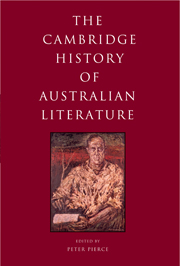Book contents
- Frontmatter
- Introduction
- FROM EUROPEAN IMAGININGS OF AUSTRALIA TO THE END OF THE COLONIAL PERIOD
- 1 Britain’s Australia
- 2 The beginnings of literature in colonial Australia
- 3 Early writings by Indigenous Australians
- 4 Australian colonial poetry, 1788–1888: Claiming the future, restoring the past
- 5 No place for a book? Fiction in Australia to 1890
- 6 Romantic aftermaths
- FROM THE LATE NINETEENTH CENTURY TO 1950
- TRAVERSES
- FROM 1950 TO NEARLY NOW
- Select bibliography
- Index
- References
5 - No place for a book? Fiction in Australia to 1890
from FROM EUROPEAN IMAGININGS OF AUSTRALIA TO THE END OF THE COLONIAL PERIOD
Published online by Cambridge University Press: 28 May 2011
- Frontmatter
- Introduction
- FROM EUROPEAN IMAGININGS OF AUSTRALIA TO THE END OF THE COLONIAL PERIOD
- 1 Britain’s Australia
- 2 The beginnings of literature in colonial Australia
- 3 Early writings by Indigenous Australians
- 4 Australian colonial poetry, 1788–1888: Claiming the future, restoring the past
- 5 No place for a book? Fiction in Australia to 1890
- 6 Romantic aftermaths
- FROM THE LATE NINETEENTH CENTURY TO 1950
- TRAVERSES
- FROM 1950 TO NEARLY NOW
- Select bibliography
- Index
- References
Summary
If the film The Proposition (2005) is anything to go by, 19th-century Australia was, at first glance, no place for a book. Set in a Queensland frontier town in the 1880s, the film opens with a dramatic shoot-out, establishing the idea that ‘the outback’ was brutal and bloody. Later, books make brief and telling appearances. We see blurred glimpses of them on the shelves of an English-style homestead, the home of Captain Maurice Stanley, who repeatedly proclaims his determination to civilise the land and its inhabitants. Stanley’s wife Martha is shown alone, holding a volume and framed against a beautiful, desolate landscape, a shot that registers a sense of the escape and other-worldliness books might offer a woman marooned in this harsh, masculine environment. Books and reading are not only aligned in the film with the feminine, the melancholic and the domestic, however. The Irish outlaw Arthur Burns quotes poetry and is pictured in his cave-refuge with numerous books, making an interesting parallel with the Stanleys’ homestead that complicates differentiations between law-enforcer and criminal. It also draws attention to the recruitment of literature, both in terms of thematic content and the cultural value it has been variously assigned, to assist in the fixity of social distinctions, especially in colonial contexts where they often seem ill-assured. And we are left to wonder whether the heavy books that lie open and ordered before Stanley on his study desk, as he casually consents to the murders of captured Aboriginal men, authorise such actions in legal terms, scientific theory or imaginative narrative, and if books to follow might record at all these lives soon-to-be extinguished.
- Type
- Chapter
- Information
- The Cambridge History of Australian Literature , pp. 93 - 117Publisher: Cambridge University PressPrint publication year: 2009

